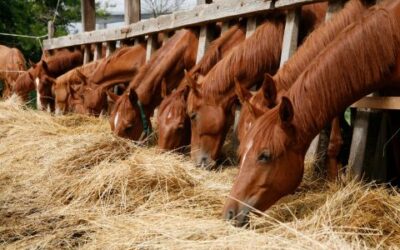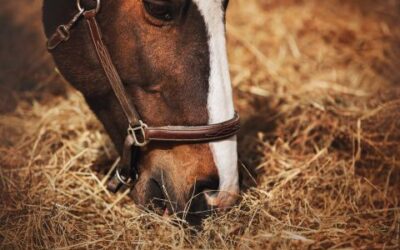 For horses, particularly performance horses, ulcers are becoming more common. In fact, according to Beth Davis, DVM, Ph.D., DACVIM of Kansas State University in Manhattan, Kansas, “Gastric ulcers have been reported to affect up to 90 percent of racehorses and 60 percent of show horses.” Equine gastric ulcers are more than uncomfortable for your horse. They are also a severe health risk that can cause performance issues and ulcers. Keep reading to learn a few management practices that can help you reduce the risk of, and even prevent, ulcers in your horse.
For horses, particularly performance horses, ulcers are becoming more common. In fact, according to Beth Davis, DVM, Ph.D., DACVIM of Kansas State University in Manhattan, Kansas, “Gastric ulcers have been reported to affect up to 90 percent of racehorses and 60 percent of show horses.” Equine gastric ulcers are more than uncomfortable for your horse. They are also a severe health risk that can cause performance issues and ulcers. Keep reading to learn a few management practices that can help you reduce the risk of, and even prevent, ulcers in your horse.
- Maximize Turnout: Horses evolved to live outside and do their best when they are turned out frequently. In order to mimic their natural habit, limit their time spent in the barn and allow them plenty of time outside.
- Free Choice Forage: One of the best ways to limit the likelihood of stomach ulcers in horses is to ensure access to free-choice forage. Horses evolved as grazing animals and they are designed to constantly have forage moving through their system. Because of this, they constantly produce stomach acid (unlike humans, who only produce stomach acid when eating).
- Use Slow Feeders: Slow feeders can slow your horse’s rate of consumption and make sure that their forage rations last throughout the day. Look for ones that are made from plastic or mesh, as metal slow feeders can have an adverse effect on your horse’s dental health.
- Consider a Digestive Supplement: Many supplement manufacturers have created digestive supplements with prebiotics and probiotics. These supplements help to ensure that your horse’s digestive system is working as optimally as possible.
- Feed Alfalfa: Feeding alfalfa is a great way to add an acid buffer to your horse’s diet. Even when fed in small amounts, the high calcium content in alfalfa can protect the lining of the digestive system (similar to people eating Tums!). Alfalfa for horses is a great way to provide quality nutrition and promote digestive health.
- Limit Stress: Just like with people, stress can wreak havoc on your horse’s digestive system. Look for ways to limit stress in their life, such as turning them out earlier in the morning or bringing them inside before the bugs start to bother them.
- Consistent Routines: Many horses thrive on routines. These routines make them feel comfortable and can also limit their stress. Try to establish a routine that works for you and your horse whenever possible.
- Minimize Grain: Grain is an important piece of many horses’ diets. However, large amounts of grain can be one of the causes of ulcers in horses, due to the amount of stomach acid needed to break down the nutrient-rich foodstuffs. Take a hard look at your horse’s diet and see if you could be feeding them more forage and less grain to meet their caloric requirements.
- Be Wary of Medications: Some anti-inflammatory and antibiotic medications (such as Bute and Doxycycline) have been shown to promote digestive distress. If you are worried about your horse’s digestive system, be sure to speak with your veterinarian. They may prescribe a different medication or encourage you to use omeprazole to counteract the ill effects.
- Consistent Access to Clean Water: It goes without saying, your horse should always have access to clean, fresh water. Optimal hydration is essential for digestion. If your horse is dehydrated, they will not be able to digest their forage as needed.
A responsible, healthy, well-rounded approach to raising horses goes a long way toward preventing ulcers in horses. A lot of it is common sense and keeping your eyes open. You can trust Lucerne Farms for the highest-quality products for your horse. Contact us with any questions.




